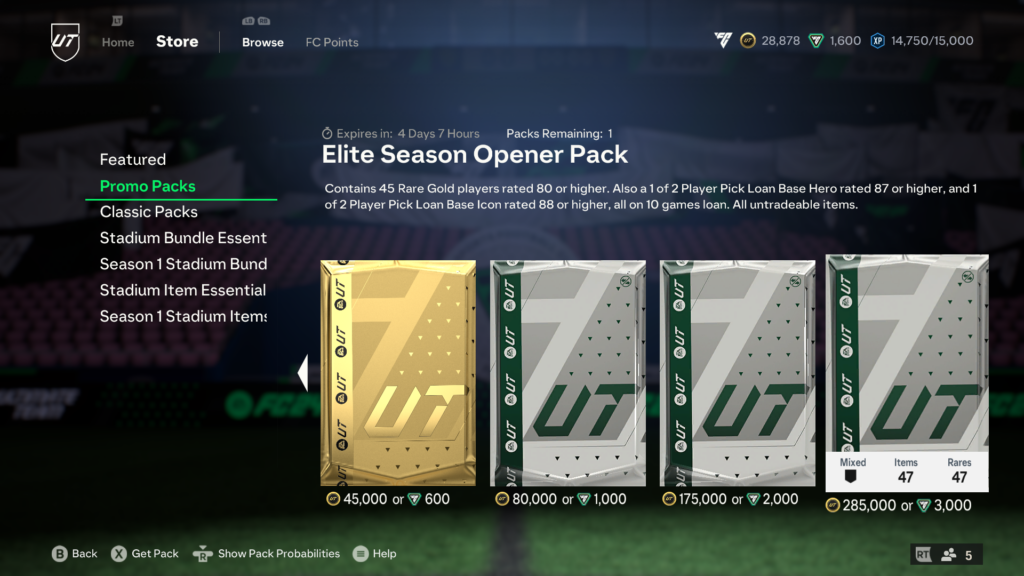Explore the intricate debate surrounding EA Sports FC 24’s Ultimate Team packs. Are they an innovative gaming feature or a veiled form of gambling? This comprehensive analysis delves into the mechanics, player impact, and the broader implications for the gaming industry, offering a balanced perspective on this contentious issue.
In recent years, the intersection of video gaming and gambling has become a hotly debated topic, with EA Sports’ franchise at the forefront of this discussion. The release of EA Sports FC 24, particularly its Ultimate Team mode, has reignited concerns and debates about whether the mechanics of purchasing packs in-game constitutes a form of gambling. This article aims to delve into these concerns, offering a balanced analysis of the Ultimate Team packs, their mechanics, and the broader implications for players and the gaming industry.
Introduction
Electronic Arts (EA) Sports has long been a titan in the sports video gaming industry, with its annual releases capturing the hearts of football fans worldwide. The transition from FIFA to EA Sports FC 24 marked a new era for the franchise, promising enhanced gameplay, more realistic graphics, and deeper game modes. Among these, the Ultimate Team mode remains one of the most popular and controversial features. This mode allows players to build their dream team by acquiring players through packs, which can be purchased with in-game currency or real money.
The controversy stems from the mechanics of these packs, often compared to gambling due to their randomized nature and the use of real money. Critics argue that this system preys on the psychology of reward and risk, similar to gambling, while proponents defend it as an integral part of the game’s competitive and engaging experience.
The Mechanics of Ultimate Team Packs
At the heart of the Ultimate Team mode is the acquisition of packs, which contain random items and players. These packs are central to building a competitive team, as they can include high-rated players, consumables, and other items beneficial to enhancing a player’s squad. The allure of obtaining rare and powerful players has made pack purchasing a significant activity within the game.
Players can acquire packs through gameplay achievements or by purchasing them with FIFA Points, a currency bought with real money. The chance-based nature of these packs, where players might spend real money without a guaranteed return of value, is where the controversy lies. This system has been likened to gambling, as players are essentially betting on the odds of receiving valuable items.
The “Surprise Mechanics” and Public Reaction
EA’s defense of Ultimate Team packs, referring to them as “surprise mechanics,” has sparked widespread debate. This term was used to describe the packs during discussions with regulatory bodies and in public forums, in an attempt to differentiate them from gambling. EA argues that these mechanics are similar to Kinder Eggs or collectible card games, where the excitement and value come from the surprise of not knowing what you will receive.
However, this comparison has not quelled concerns. Critics argue that the psychological effects, especially on younger players, can be profound, leading to addictive behaviors similar to gambling. The thrill of opening packs, coupled with the social and competitive pressure to build a strong team, can encourage continuous spending.

Image taken from IGN.
Financial Implications and Player Experiences
The financial aspect of Ultimate Team packs cannot be overlooked. Players can spend significant amounts of money without securing the players or items they desire, leading to frustration and further spending. This cycle mirrors gambling’s chase for the next big win, with the added layer of social competition driving players to invest more to keep up with or surpass their peers.
Conversely, some players view the purchase of packs as a personal choice, integral to the game’s enjoyment and competitive nature. They argue that no player is forced to spend real money and that success in Ultimate Team can still be achieved through gameplay alone, albeit with more time and effort.
The Lawsuit and Broader Implications
The controversy reached a legal head when EA faced lawsuits alleging that the Ultimate Team packs constitute unregulated gambling. These legal challenges brought the debate into the public eye, forcing a reevaluation of how such game mechanics are perceived and regulated. While not delving into the legal aspects, it’s crucial to recognize the impact of these proceedings on public perception and the gaming industry’s future practices.
The lawsuit and the term “surprise mechanics” have become focal points in a broader discussion about the responsibility of game developers to protect players, especially minors, from potential harm. This debate extends beyond EA Sports and touches on the gaming industry’s practices, challenging developers to find a balance between monetization and player welfare.
Balancing Engagement with Player Welfare
The core of the debate around Ultimate Team packs lies in the balance between creating an engaging game experience and ensuring player welfare. EA Sports, like many game developers, faces the challenge of designing compelling content that also respects the well-being of its players. The randomized nature of packs is defended as adding excitement and variability to the game, making each player’s experience unique and rewarding. However, this randomness also introduces a risk element, where the value received may not always match the player’s investment, be it time or money.
To address concerns, some suggest more transparency in the odds of pack contents, allowing players to make informed decisions about their purchases. Others propose a more robust system of rewards for gameplay achievements, reducing the emphasis on purchasing packs as the primary means to advance or compete.
The Industry’s Response
The gaming industry’s response to the controversy surrounding loot boxes and similar mechanics has been varied. Some developers have removed or significantly altered these systems in response to public backlash or legal challenges. Others have introduced more transparency or limited the ability to spend real money.
EA Sports has made efforts to disclose pack odds, providing players with some insight into their chances of obtaining high-rated players. However, critics argue that more comprehensive measures are needed to protect vulnerable players, especially minors, from potential harm.
The Future of Randomized In-Game Purchases
The future of randomized in-game purchases, such as Ultimate Team packs, is likely to be shaped by ongoing public debate, legal challenges, and potential regulation. There is a growing call for the gaming industry to adopt more ethical practices in monetization strategies, prioritizing player welfare over profit.
One potential direction is the development of alternative monetization models that do not rely on chance-based mechanics. Subscription models, direct purchases of in-game items, and cosmetic-only microtransactions are examples of strategies that can provide revenue without the ethical and legal concerns associated with gambling-like mechanics.
Ethical Considerations and Player Choice
An important aspect of this debate is the ethical responsibility of game developers to their audience. While it is crucial to offer engaging and profitable games, developers must also consider the impact of their monetization strategies on players. Encouraging spending through systems that resemble gambling raises questions about the exploitation of psychological vulnerabilities for profit.
However, it’s also essential to recognize the role of player choice. Many players engage with Ultimate Team packs and similar mechanics responsibly, viewing them as a fun aspect of the game rather than a necessity. The challenge lies in ensuring that all players can enjoy the game without feeling pressured to spend beyond their means or engage in risky behaviors.
Conclusion
The controversy over whether EA Sports is promoting gambling through Ultimate Team packs in EA Sports FC 24 underscores a critical issue at the intersection of gaming and gambling. While these packs provide excitement and a sense of achievement for many players, they also raise concerns about potential harm and the exploitation of gambling-like mechanics.
Moving forward, the gaming industry must navigate these concerns carefully, balancing the need for engaging content with the imperative of player welfare. This may require innovative approaches to game design and monetization, greater transparency, and a commitment to ethical practices that respect the well-being of the gaming community.
As players, industry stakeholders, and regulators continue to debate and shape the future of in-game purchases, the hope is that a fair balance can be struck. One that preserves the joy and excitement of gaming, while protecting players from the risks associated with gambling-like mechanics. The journey of EA Sports FC 24’s Ultimate Team packs is just one chapter in this ongoing story, reflecting broader challenges and opportunities within the gaming industry.




